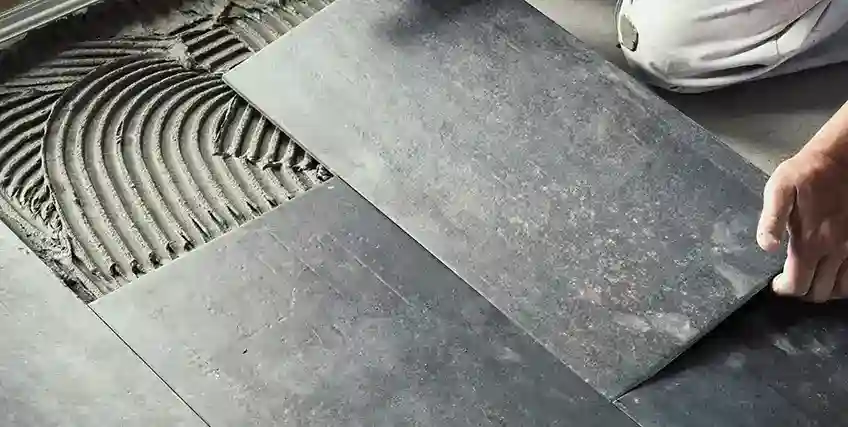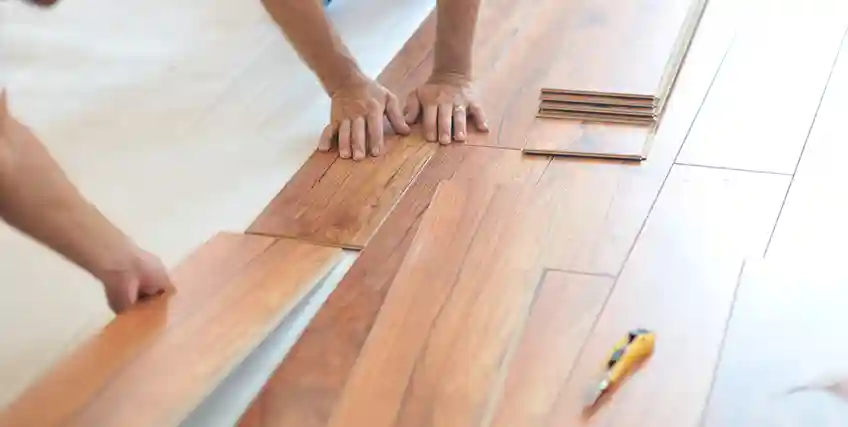Need a Floor Overhaul? Financing Options for Your Flooring Business
November 26, 2025 | Last Updated on: November 26, 2025

New flooring projects aren’t just about tiles and glue; they’re about margins, timelines, and expectations. For small flooring businesses, that means managing tight budgets while delivering flawless finishes.
But what happens when a big project comes in and you’re low on working capital? Or when old tools stall work mid-installation? That’s where smart flooring financing options can help.
From buying high-grade laminate in bulk to hiring skilled labor, the right financing can keep your operations smooth. In this guide, we’ll explore how to finance new flooring needs without losing momentum or cash flow.
Why Flooring Businesses Need Financing
Flooring is capital-intensive. If you’re running a small flooring business, large upfront expenses are common.
You may need to buy laminate, hardwood, or vinyl flooring in bulk before a job starts. Equipment upgrades - from polishers to laser measurers - don’t come cheap.
Delays in customer payments can lead to serious cash flow issues, especially if you’re managing payroll or ordering new supplies. Financing helps you stay ahead without dipping into emergency reserves.
Business owners often use flooring financing options to remodel showrooms, hire more contractors, or increase warehouse capacity. Others tap into flooring finance options to handle seasonal demand spikes or commercial expansions.
It’s not just about survival; it’s about scaling smart.
Whether you're in residential remodeling or large commercial flooring jobs, working capital can be the difference between winning a project and watching it go to a competitor.
Top Flooring Financing Options Available
The best flooring financing options depend on your needs, revenue, and credit score. Here are some practical choices:
Term Loans
These are fixed lump sums repaid over months or years with interest. Use them for showroom upgrades, inventory expansion, or full business remodels. Term loans often have longer repayment terms and structured monthly payments. But approval takes time, and you'll need a solid credit score.
Equipment Financing
Need a commercial tile cutter or floor scrubber? This type of loan is tied to the equipment itself. Lenders offer fast funding decisions and flexible payment options. The equipment serves as collateral, lowering interest rates. This is one of the best flooring financing options if you're scaling operations.
Business Line of Credit
This is revolving credit, which means you draw what you need and only pay interest on that. It’s perfect for managing short-term expenses like new tools or small flooring jobs. A great option for cash flow dips between project payments. Many business owners prefer this over term loans for day-to-day flooring purchase needs.
SBA Loans
Backed by the U.S. Small Business Administration, these loans have low interest and longer terms for qualified applicants. Perfect for growing flooring businesses with strong credit and detailed plans. The application is intense, but rates are often better than banks. Use this to finance an office move, hire staff, or upgrade your warehouse.
Merchant Cash Advances
You get a lump sum and repay through a percentage of daily sales. It's risky, especially for seasonal flooring businesses, but sometimes useful in emergencies. This is a last-resort option in your flooring financing options list.
Choosing the Right Option for Your Flooring Business
Picking the right financing depends on how much you need, how fast, and what your repayment ability looks like. Term loans work well for bigger investments like full renovations or opening a second location. You’ll get predictable monthly payments but need solid credit.
If you want to finance new flooring equipment, go with equipment financing. The asset itself reduces risk for lenders and lowers interest rates. For flexible access to funds, especially during payment delays, a business line of credit is best. You use what you need and avoid paying interest on the full amount.
Looking for government-backed, low-interest options? SBA loans are the way to go but be ready for lots of paperwork and a longer approval timeline. Stay away from merchant cash advances unless you have no other choice. They cost more and can strain daily cash flow.
You should also consider your credit score. If your credit score is weak, focus on building it up or explore microloan providers. No matter what you choose, read all terms. Know your payment options, interest rate, and if there's a promotional period.
Use a financing calculator to estimate your real cost. Don’t just focus on the monthly amount. Factor in the annual fee, total repayment, and potential late penalties.
What Lenders Look for in Flooring Businesses
Before approving your application, most financing providers evaluate five key factors.
Credit Score & Credit History
A strong credit score (above 650) gives you better access to low-interest loans. Lenders look at how you’ve handled previous loans and monthly payments. A clean repayment history increases your chances of getting flooring financing options.
Annual Revenue & Business Age
If your flooring company has been operating for over two years with steady income, that’s a green flag. Higher annual revenue supports larger loan approvals. These factors influence whether you’ll qualify for the best flooring financing plans.
Equipment or Project Cost Breakdown
Be specific. The clearer your breakdown, the better your odds. It helps providers tailor your flooring financing options. Don’t forget to include invoices or quotes if available.
Client Pipeline or Booked Projects
Showing upcoming work like commercial contracts or home remodels strengthens your case. If you can prove future revenue, financing providers would feel more confident. This supports larger limits and flexible financing options for your flooring business.
Legal & Financial Compliance
File taxes on time. Renew licenses. Late filings or missing paperwork can stall approvals. Be transparent with purchase dates, financial reports, and disclosures to speed up the process. Strong documentation also unlocks better flooring finance options.
Tips to Improve Your Approval Odds
Want to improve your chances of approval? It starts with your credit profile.
First, pull your business and personal credit scores. Fix any errors fast. Clear overdue balances if you can. Next, apply only for the amount you truly need. Overestimating makes you look risky.
Organize your financials - tax returns, bank statements, revenue reports. Have them ready to go. If your credit isn’t great, offer a down payment or collateral to lower your lender’s risk.
And be clear about how you’ll use the funds. If you're looking to finance new flooring equipment, show cost breakdowns and vendor quotes.
If possible, start with flexible financing providers before applying to a traditional bank. They usually process quicker and are more open to small businesses. Most importantly don’t rush. Read all terms. Watch for hidden fees, long promotional periods, or variable interest rates.
Conclusion
In today’s market, having access to the right flooring financing options can shape how fast your business grows. From upgrading tools to managing big orders, funding gives you room to operate better and serve more clients.
There’s no universal fit - some need flexibility, others need scale. Pick the option that matches your business stage, credit profile, and growth plans. And if your flooring installation jobs are getting bigger, it’s time your financing matched up.
Plan ahead, compare offers, and don’t settle for bad terms. The right financing can turn potential into profit.
FAQs
What are the best flooring financing options for small businesses?
That depends on what you need and how fast. If you're focused on long-term investments like opening a new showroom, a term loan might make sense. But for recurring jobs or seasonal cash flow gaps, a line of credit could offer more breathing room. Some business owners also explore equipment financing for tools or promotional financing for bulk orders. The real key? Matching your business cycle to the funding structure. That’s how the best flooring financing becomes a strategic decision and not just a lifeline.
Can I finance new flooring equipment with bad credit?
It’s not impossible, but your options will look different. If your credit score is low, expect lenders to offer smaller amounts or ask for collateral. Some will look at your business cash flow instead of just your score. That said, higher interest rates and shorter repayment terms are common. Still, if your equipment need is urgent, and you’ve got stable monthly revenue, certain flooring finance options may still work. Just make sure to calculate the real cost before you say yes.
Is it better to lease or finance new flooring tools?
That depends on how often you upgrade and how long you’ll use the tool. If you’re working on short-term contracts or expect to replace tools often, leasing offers flexibility. But if the equipment is essential, like a commercial grinder or cutter, owning it might save money over time. Financing gives you equity and control. Either way, weigh total cost of ownership, monthly payments, and terms. Think beyond price. Think how the asset will support your growth.
Can I use financing for hiring staff or subcontractors?
You can, if your financing is flexible enough. A term loan or business line of credit can fund labor costs, especially during large contracts. But be cautious. Hiring means recurring expenses. Make sure your projections account for that. While some flooring financing options allow it, lenders may ask how you plan to manage payroll if the project ends. If labor is tied to revenue (e.g., a big commercial job), it's usually easier to justify and secure approval.
What documents do I need to apply?
At minimum, you’ll need business bank statements, tax returns, flooring vendor quotes, and legal licenses. For equipment financing, invoices or supplier details are a must. If you’re applying for flexible or promotional financing, you may also need a business plan or customer contract pipeline. Remember: organized paperwork builds confidence. It shows you’re serious, not scrambling. Most flooring financing options require more than just a signature—they want a story of stability and growth.




